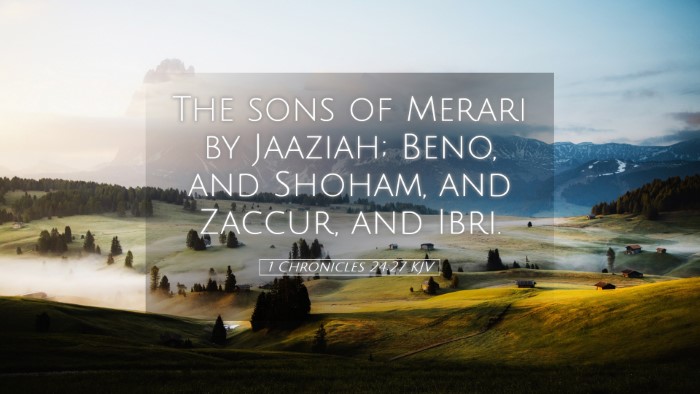Commentary on 1 Chronicles 24:27
Verse Overview: 1 Chronicles 24:27 states, “For they were in the divisions of the gatekeepers, so that they could serve in the house of God.” This verse provides insight into the organization and duties of the Levites, particularly in relation to their roles in the temple service.
Context of the Passage
The book of Chronicles is a historical account focusing on the priestly and Davidic lineage, emphasizing worship and governance in Israel. The outline of the chapters deals with the organization of the Levitical priesthood and their roles in Temple service, which is critical for understanding the centrality of worship in Israelite life.
Commentary Insights
Matthew Henry's Commentary
Matthew Henry provides a diligent analysis of the priestly organization. He notes that the division of duties among the Levites reflected God’s order in worship. Each division was appointed specific responsibilities, and gatekeeping was integral to temple service as it ensured that only those qualified could approach the sacred spaces. This system of division illustrates the structure God ordained for worship, which was essential to maintain holiness and order before Him.
Albert Barnes' Commentary
Albert Barnes emphasizes the significance of the gatekeepers’ roles as representatives in the temple’s hierarchy. He highlights the symbolic nature of these divisions; being a gatekeeper was not merely about physical entry but encapsulated a spiritual essence. The gatekeepers were tasked with maintaining the sanctity of the temple by overseeing who could enter and ensuring that worship practices were properly adhered to, which illustrates the reverence required in approaching God.
Adam Clarke's Commentary
Adam Clarke offers a comprehensive view on the implications of these divisions, particularly how they align with the broader structure of Levitical service. He discusses how serving in the house of God through such roles prepares the Levites to fulfill their spiritual duties. Clarke points out that the organization facilitated a smooth operation within the temple, enabling an atmosphere conducive to worship and ensuring that all aspects of the sacrificial system were honored according to God's directives.
Theological Implications
From these commentaries, several theological implications arise:
- Divine Order: The precise organization of the Levites underscores the importance of order and structure in the life of God’s people. This teaches that God values not just the worship itself but also how it is administered.
- Roles of Servants: Each duty, no matter how seemingly minor like that of a gatekeeper, contributes to the integrity of worship. This indicates that all roles in the church, regardless of visibility, are vital to spiritual health.
- Access to God: The role of the gatekeeper symbolizes the approach to God; it reflects the necessity of mediation which culminates in Christ Jesus, the ultimate mediator, emphasizing the transition from the old covenant to the new.
- Preparation for Worship: The organization aids in spiritual preparedness for worship. It serves as a reminder that true worship requires conscious effort and structure to draw closer to God.
Practical Applications
Considering the insights from the commentaries on 1 Chronicles 24:27, there are several practical applications for contemporary believers:
- Embrace Your Role: Just as the Levites were assigned specific duties, individuals in the church should embrace and understand their roles in ministry as vital for the overall functioning of the church to foster a spirit of unity.
- Maintain Order in Worship: The careful organization within the church can enhance worship experiences. Pastors and church leaders should prioritize respecting and implementing structures that maintain holiness and order in worship services.
- Holiness in Approach: The way we approach God in worship should be treated with reverence and seriousness. This calls for preparation and intentionality, reflective of the gatekeepers' diligence.
- Encourage Active Participation: Like the Levites, all believers are called to be active participants in worship. Encouraging congregational involvement aligns with God’s design for corporate worship where each member contributes to the body of Christ.
Conclusion
1 Chronicles 24:27 encapsulates a significant aspect of the structure of worship in ancient Israel. The verses remind us of the importance of order, roles, and preparation in worshiping God. Through the commentaries of Henry, Barnes, and Clarke, we glean insights that remain relevant today, encouraging us to approach worship with intentionality, to respect our respective roles, and to maintain an atmosphere conducive to experiencing God's presence. Each commentary provides a rich resource for understanding how the organization of worship under the Mosaic Law foreshadows the greater realities of the worship we are called to engage in through Christ in the New Covenant.


